Layering History & Creativity with Makin' Cake
Poet Dasha Kelly leads performance and writing workshop for Arts@Clark event
Arts@Clark served up something sweet this month to the Clark community—Makin’ Cake, a two-part event by Wisconsin Poet Laureate, Dasha Kelly. Sponsored by Clark College Foundation, the series blended history, performance, creativity, and—of course—cake into a layered experience that celebrated the power of story.
Makin' Cake
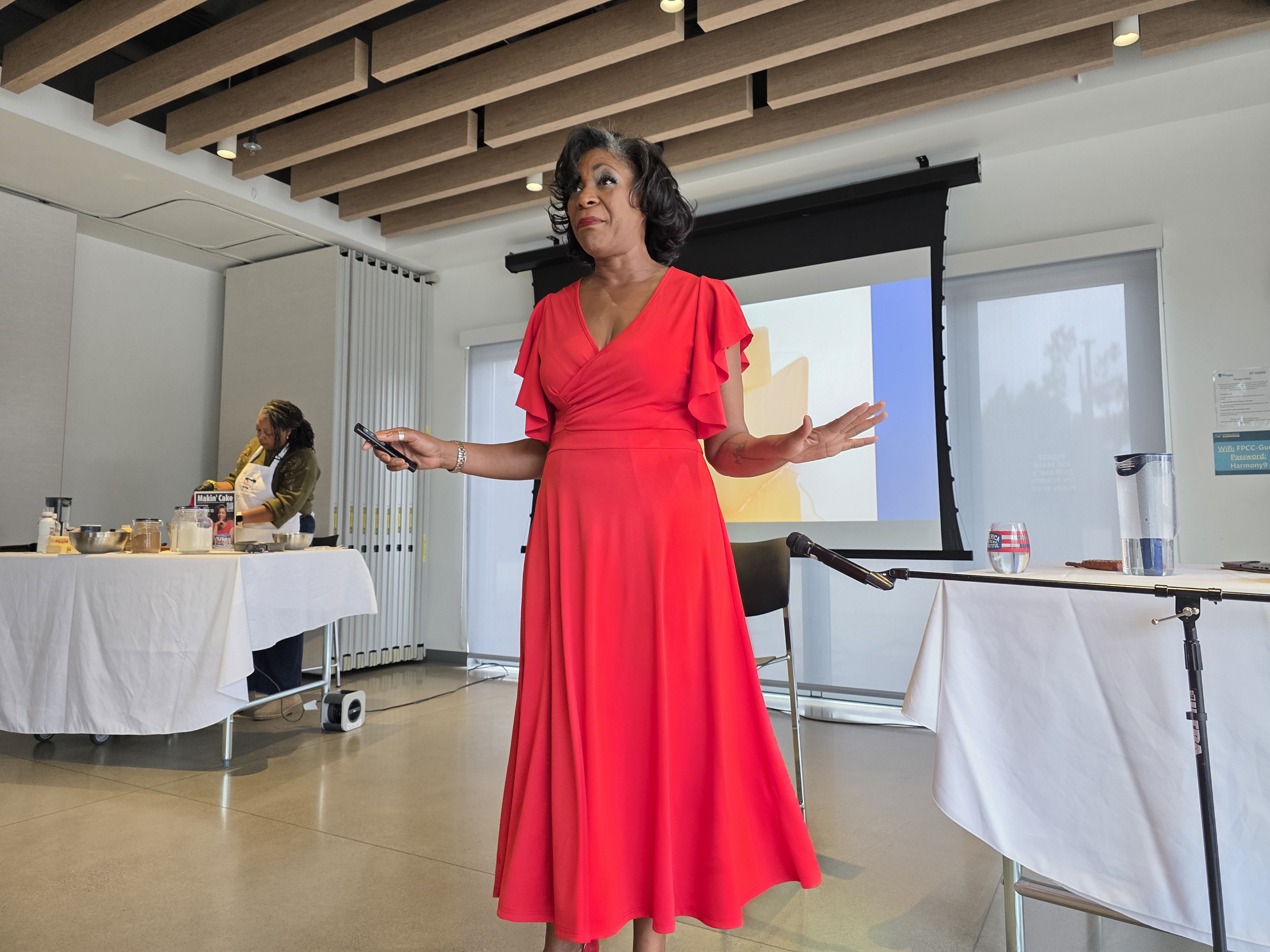
Held at the Fourth Plain Community Commons on October 12, the first part of the series featured a 50-minute performance of Makin’ Cake by Kelly (pictured above). Through humor, history, and heartfelt storytelling, she took the audience on a journey through the history of cake in America—and what it reveals about the nation itself.
“I don’t bake,” she began with a dramatic scoff, admitting that while she loves to eat cake, she has no interest in making it.
Weaving together wit, science, and social commentary, Kelly explored how something as simple as cake reflects America’s complex history of class, migration, race, and identity. She explained that early cakes were often reserved for special occasions—both because of the time required to make them and the expense of the ingredients. But not all cakes were created equally. While wealthier families could afford refined sugar, others relied on honey or dates as substitutes.
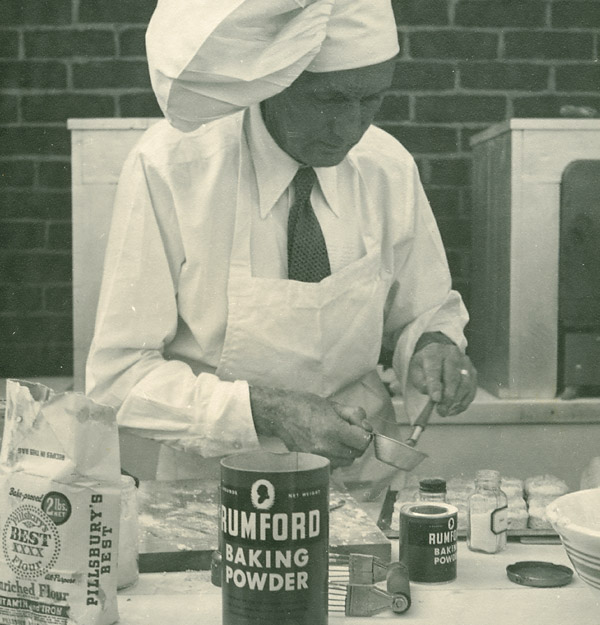
“Science was the catalyst for the cake boom,” she said, explaining how innovations in food chemistry made baking more accessible, but not equitable.
Kelly’s energy was infectious as she led her spell-bound audience of over 100 community members through this journey of makin’ cake. With each story, she layered in moments of laughter and reflection, using rhythm and emphasis to connect events like the Great Butter Rebellion at Harvard University in 1766 as the first recorded Harvard student protest. Also included was the invention of baking powder in 1843 by Alfred Bird who created a leavening agent because his wife had a sweet tooth but was allergic to yeast and eggs; his baking powder was later mass produced in 1956 as Rumford Baking Powder, even as we know it today. These baking evolutions led to the broader story of generational inheritance and inequity in America.
Photo: Rumford Baking Powder from Rumford Center
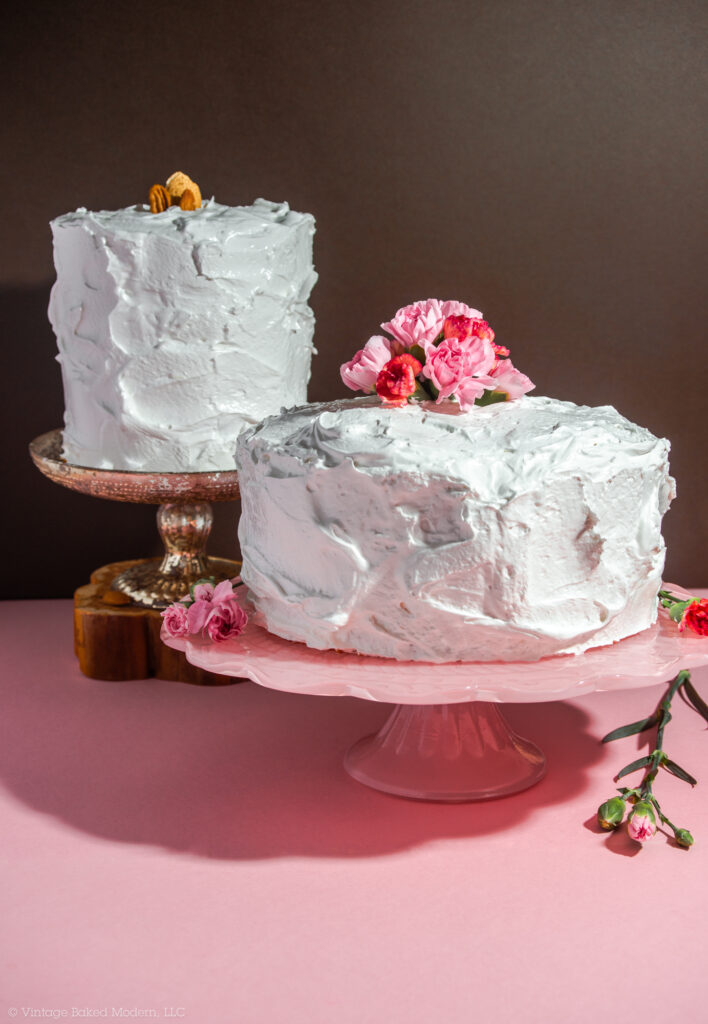
“There are layers to American baking,” she told the crowd. “The first one uses honey instead of sugar, or perhaps it’s an ash cake [rustic flatbread cooked on ash] instead of a traditional cake. The middle layer might splurge on nuts and gazing. Then there’s the elegant Lady Baltimore Cake at the top with its light fluffy white frosting. It’s how the lower layers imagined the top layer to be living...and they were right.” Lady Baltimore Cake pictured to the right.
As she guided the audience through the 20th century, Kelly described how shifting social roles and marketing transformed American kitchens. The “new women” of the 1920s no longer cooked, which sparked fear among men who soon became advocates for home baking. By the 1950s, the advent of new appliances and domestic science classes (“But no other sciences,” Kelly quipped) created a nationwide network of white women housewives. When the Rumford company sought to capitalize on this boom, branding quickly replaced bargains and Rumford Baking Powder became the standard leavening agent for baking.
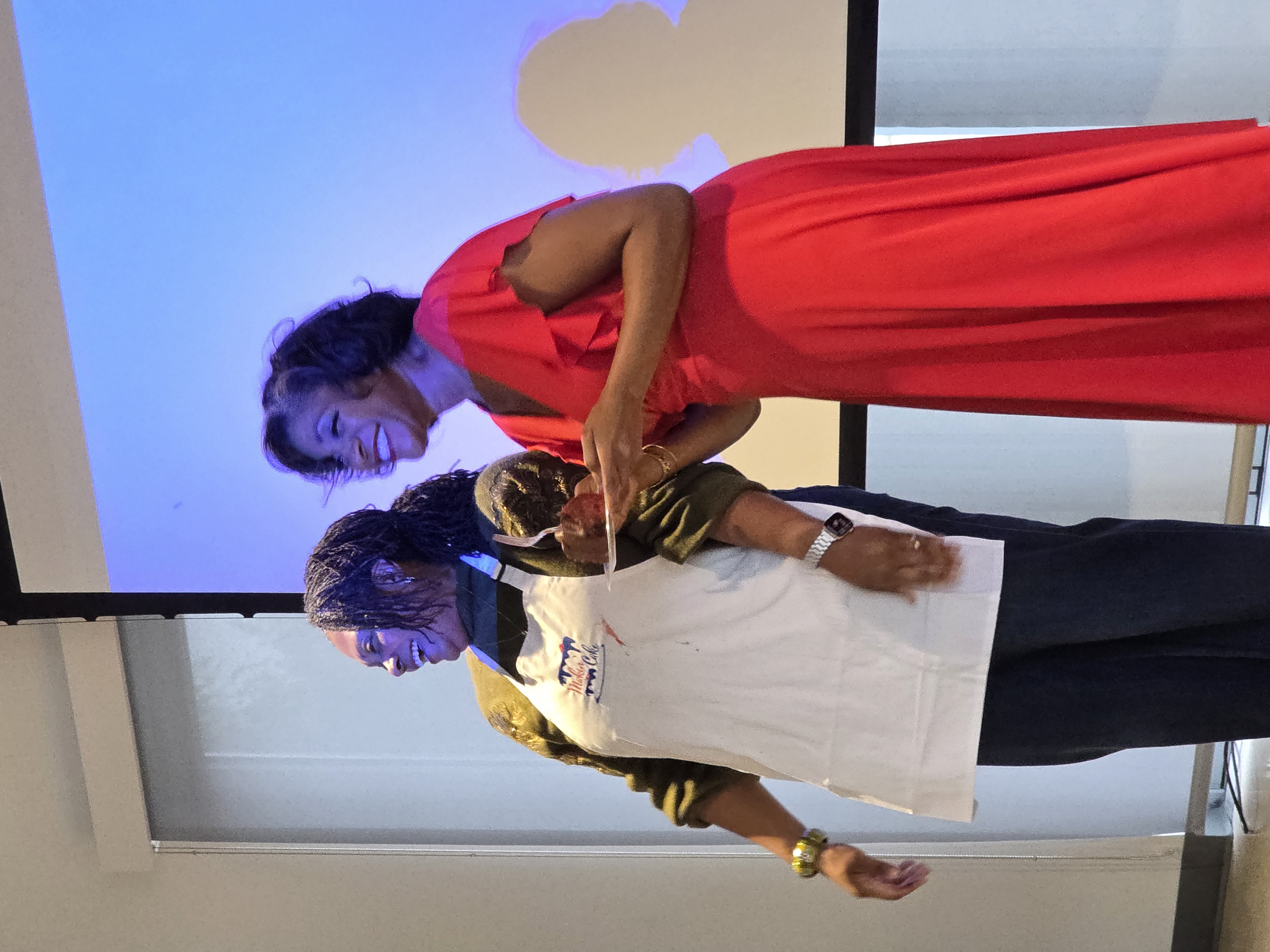
Throughout the performance, Kelly used the science of baking as a metaphor for the way the country operates. “The American Cake,” she concluded, “was a recipe designed for white men. It’s a complicated cake, and ingredients are combusting like we knew they would.”
As Kelly spoke, Dr. Michele Cruse (pictured left with Kelly), deputy director of Fourth Plain Community Commons, acted as her assistant and quietly worked alongside Kelly to prepare a cake from scratch, which was later given away to a lucky audience member.
After the performance, Kelly led a discussion where audience members were invited to consider what ingredient they would add to this American cake. Responses opened a conversation about kindness, inclusion, and our shared values and challenges.
Among the attendees was Susan Dingle, Vancouver’s own Poet Laureate, who joined the discussion. Guests also enjoyed cupcakes—each baked with all the right ingredients—courtesy of Clark College’s McClaskey Culinary Institute students.
The Play Pen
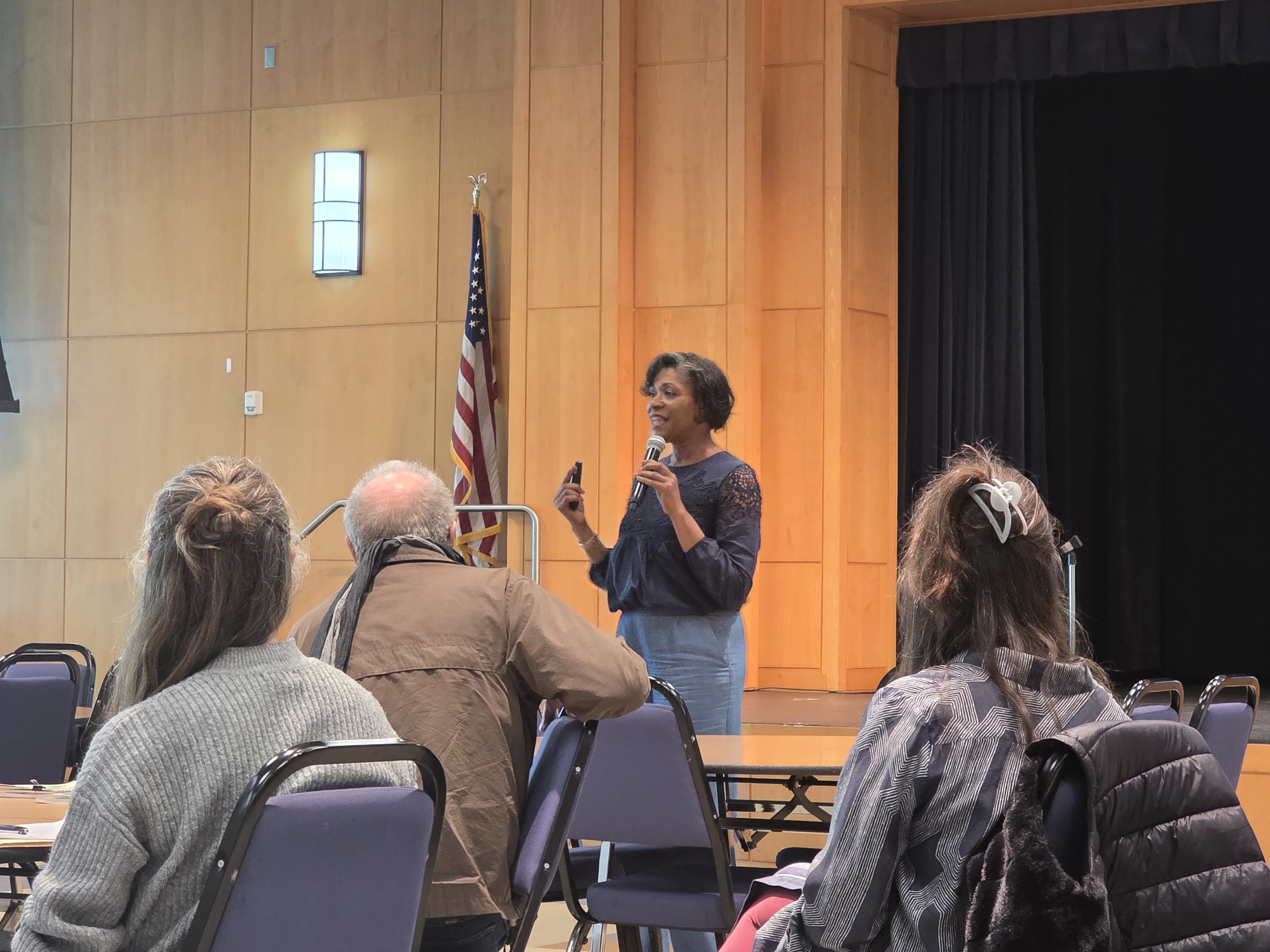
At the second session of the series, held on October 15 in Gaiser Hall, Kelly traded performance for play. She returned to lead The Play Pen, a creative writing workshop that reminded participants that writing should be fun.
The session invited community members, students, and instructors to explore creativity through unexpected prompts drawn from music, film, and conversation. Kelly told the group that the goal wasn’t to leave with a polished piece, but with ideas and habits to carry forward.
“We’re in the same vehicle,” she said, “but we’re on a different ride,” highlighting that everyone’s perspective is unique, and every voice deserves space.
The first prompt began with a clip of Vikings, introducing the concepts of Valhalla and Valkyries. Kelly asked the group to consider how these ideas might apply to the modern day. Participants wrote freely, then shared reflections on power, belonging, and choice.
That conversation flowed naturally into the next prompt, a recording of a song “Frankie and Johnny.” Kelly explained that the song was based on a real woman whose story had be rewritten and reinterpreted (including with a movie starring Elvis Presley). But Frankie’s own voice was dismissed as others benefited from her story. The prompt asked the audience what it means to own your own story.
Each exercise built on the last. By the time Kelly played the final piece of media—a Beyoncé music video about a cheating partner—the group had already been primed to look at the layers beneath the art form. The video prompted a discussion about identity and agency, amplified by the response of two Black feminist scholars who viewed Beyoncé’s message in opposing ways. Kelly used this to open a conversation on intersectionality: how personal experiences shape perspective, and how disagreement doesn’t erase connection.
“While we may be standing on opposite sides of the road as someone else, we can still have a conversation with them without pretending like we’re all standing side by side,” she said. What began as a series of playful prompts revealed a shared exploration of voice, identity, and creative ownership.
Learn more about Clark College Foundation
This two-part series was sponsored by the Art@Clark initiative by the Clark College Foundation, an independent, self-governed nonprofit partnered with Clark College to broaden access to higher education and strengthen community engagement. The Foundation strives to advance student success and program excellence for educational opportunities to be accessible to all at Clark College. Each year, the Foundation provides critical funding through scholarships, program support, and financial aid. In the 2024-25 academic year alone, Clark College Foundation awarded more than $1.8 million in scholarships, special awards, and financial support to over 700 Clark students. Altogether, the Foundation provided over $5.1 million in support of students, programs and capital projects. Among its initiatives are support for first-generation students, veterans and military-affiliated learners, and basic needs programs like the Penguin Pantry.
Learn more on the Clark College Foundation’s website.
Photos: Clark College/Malena Goerl
Story by Malena Goerl, Staff Writer, Communications & Marketing
